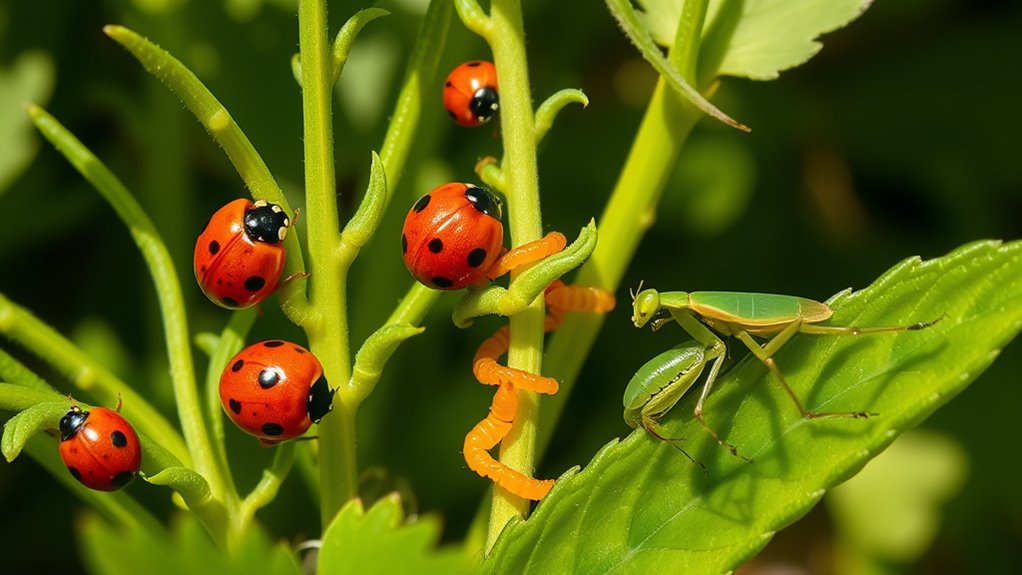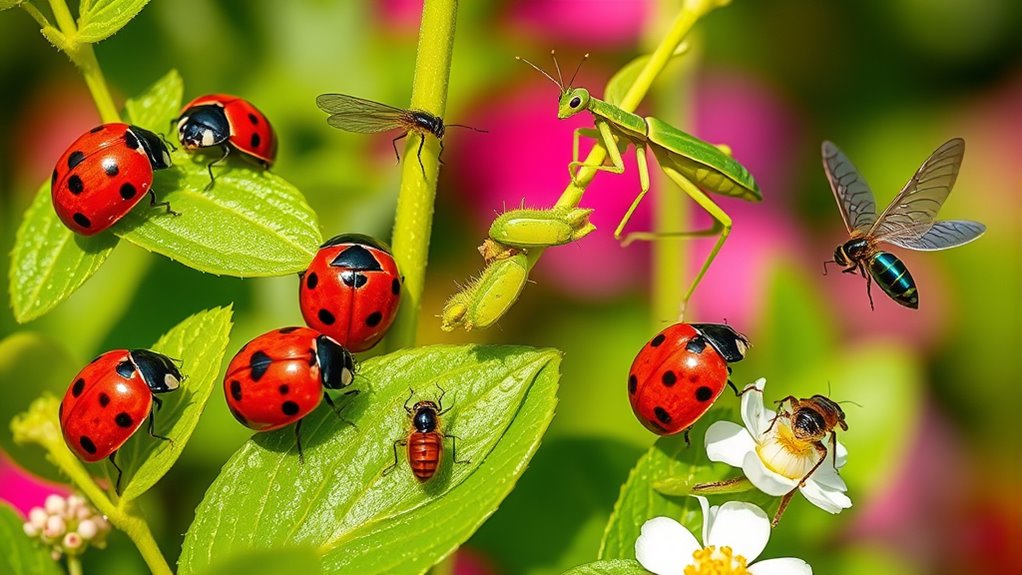To enhance your garden’s health, you should get to know seven beneficial insects: ladybugs, which eat aphids; praying mantises, targeting caterpillars and beetles; lacewings, controlling various soft-bodied pests; parasitic wasps, attacking pest larvae; hoverflies, pollinating and preying on aphids; ground beetles, managing soil-dwelling pests; and bees, essential for pollination. Recognizing and encouraging these insects can naturally keep pests in check and boost your garden’s vitality. Keep exploring to uncover more about how they support your garden’s ecosystem.
Key Takeaways
- Ladybugs are effective predators of aphids, controlling pest populations naturally.
- Praying mantises hunt a wide range of pests, including caterpillars and beetles.
- Hoverflies, especially their larvae, consume aphids and help reduce pest numbers.
- Parasitic wasps target pest insects like caterpillars and scale insects, providing biological control.
- Bees and butterflies are vital pollinators that support healthy plant growth and crop yields.

Beneficial insects can be your garden’s best allies in maintaining healthy plants and controlling pests naturally. By understanding how these helpful creatures work, you can develop effective pest control strategies that reduce or eliminate the need for chemical pesticides. These insects help keep pest populations in check, preventing damage before it becomes severe. For example, ladybugs are renowned for their appetite for aphids, while praying mantises hunt a wide range of insects, including caterpillars and beetles. Introducing or encouraging these beneficial insects creates a balanced ecosystem that keeps pest numbers low without disrupting your garden’s natural harmony.
Beneficial insects naturally control pests and promote healthy, balanced gardens.
In addition to pest control, many beneficial insects also provide essential pollination benefits. Bees, butterflies, and certain flies are indispensable for pollinating flowering plants, fruits, and vegetables. Their activity ensures that plants produce abundant, healthy yields. When you attract these pollinators, you’re not only supporting plant reproduction but also enhancing the overall productivity and vibrancy of your garden. Creating a welcoming environment for beneficial insects involves planting a variety of nectar-rich flowers, avoiding broad-spectrum pesticides, and providing habitats like insect hotels or undisturbed soil. These strategies help sustain populations of pollinators, which are indispensable for many crops and ornamental plants.
Understanding the pest control strategies employed by beneficial insects allows you to harness their natural abilities effectively. For instance, parasitic wasps lay their eggs inside pest insects, effectively controlling populations from within. Predatory insects like lacewings and predatory beetles actively hunt pests, reducing the need for chemical interventions. By fostering habitats that support these beneficial species, you promote a self-sustaining pest management system. This approach not only minimizes chemical use but also reduces the risk of pests developing resistance, which can happen with repeated pesticide applications.
Encouraging beneficial insects also benefits your garden’s overall health and resilience. These insects contribute to biodiversity, which makes your garden more resistant to disease outbreaks and pest invasions. They help break down organic matter, improve soil health, and support the growth of healthy plants. Additionally, providing habitats for beneficial insects such as native plant borders or undisturbed ground can significantly enhance their populations. By integrating the presence of beneficial insects into your gardening routine, you’re adopting a more sustainable and eco-friendly approach. This method aligns with a natural pest control strategy that relies on the complex relationships within your garden’s ecosystem, leading to a thriving, balanced landscape.
Frequently Asked Questions
How Can I Attract Beneficial Insects Naturally to My Garden?
To attract beneficial insects naturally, you should focus on creating a hospitable environment. Use companion planting to diversify your garden and provide food sources for insects. Avoid chemical pesticides and practice organic pest control methods, which attract natural predators. Plant native flowers and herbs that bloom at different times, offering nectar and pollen. By doing so, you encourage beneficial insects to stay and help manage pests effectively, keeping your garden healthy.
Are There Any Risks Associated With Introducing Beneficial Insects?
Like Pandora’s box, introducing beneficial insects may seem harmless, but risks exist. You might face pesticide interactions that harm these allies or cause unintended ecological effects, disrupting your garden’s balance. While generally safe, it’s wise to investigate specific species and avoid chemical use. By understanding these risks, you protect your garden’s delicate harmony and ensure beneficial insects can thrive without unintended consequences.
Which Beneficial Insects Are Effective Against Specific Pests?
You can target specific pests effectively by choosing pest-specific predators that have strong insect host relationships. For example, ladybugs are great against aphids, while parasitic wasps tackle whiteflies. By understanding these relationships, you guarantee your beneficial insects focus on their intended pests, minimizing harm to other insects. This targeted approach helps control pest populations naturally, reducing the need for chemical pesticides and supporting a healthy, balanced garden ecosystem.
How Do I Identify Beneficial Insects From Harmful Ones?
You might be surprised to find beneficial insects right in your garden, often blending in with pests. To distinguish them, observe pest identification and insect behavior closely. Beneficial insects tend to move deliberately, often avoiding damage or feeding on pests, unlike harmful ones. Look for differences in size, color, and activity patterns. Recognizing these subtle clues helps you protect your garden naturally, encouraging the presence of helpful insects while keeping harmful ones at bay.
When Is the Best Time to Release Beneficial Insects in My Garden?
You should release beneficial insects when pest lifecycle timing indicates they’re most vulnerable, typically early in the pest’s development. Check weather impact; release during mild, stable conditions to guarantee insects survive and thrive. Avoid releasing during heavy rain or extreme heat, which can hinder their effectiveness. Timing your release carefully helps maximize pest control, giving beneficial insects the best chance to establish and protect your garden naturally.
Conclusion
By identifying and encouraging these beneficial bugs, you’ll bolster your garden’s beauty and bounty. Embrace these essential insects, and watch your wilderness flourish with fewer foes and more flowers. With wisdom and will, you’ll ward off woes while welcoming wondrous wildlife. Cultivate a caring, conscious, and chemical-free habitat, and let nature’s natural navigators nurture your nurturing nature. Your garden’s growth will glow, gleaming with goodness, as you wisely work with these wondrous, hardworking insects.









